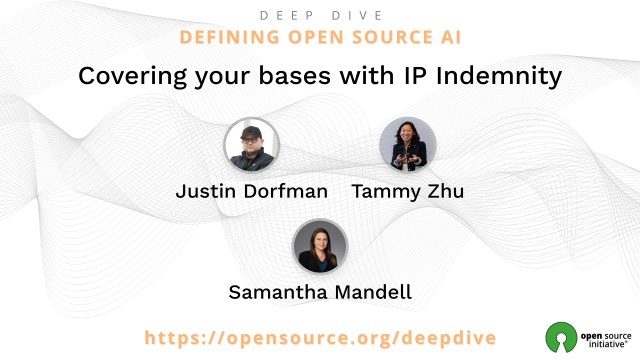Part of the Deep Dive: AI Webinar Series

When working with LLM providers that don’t have their models public (Anthropic, OpenAI, etc.), it’s near impossible to know if any Copyleft code has been trained upon. So how do you bring AI developer tools to the market without risking legal jeopardy? I asked Sourcegraph’s head of Legal, Tammy Zhu, to teach me how we protect ourselves from failing to comply with attribution requirements.
Webinar summary
In this webinar hosted by the Open Source Initiative as a part of the “Deep Dive: Defining Open Source AI” series, three speakers from Sourcegraph address key topics related to AI coding assistants and intellectual property (IP) indemnity. Justin Dorfman, the Open Source Community Manager at Sourcegraph, introduces the company’s AI code assistant, Cody, emphasizing its role in helping developers become more productive and write better code. Tammy Zhu, VP of Legal, discusses the legal risks associated with AI coding tools, primarily focusing on copyright risks and explaining how code snippets generated by AI tools are unlikely to be copyrightable. She also provides insights into the current litigation landscape and suggests strategies to mitigate risks. Samantha Mandel, Commercial Counsel, delves into the importance of IP indemnity in AI tools, highlighting that indemnity should benefit the end user. She outlines key elements of a comprehensive IP indemnity clause and compares Sourcegraph’s approach to competitors, emphasizing Sourcegraph’s commitment to protecting customers from potential legal concerns. Overall, Sourcegraph emphasizes its dedication to open source, AI, and user protection while encouraging the evolution of open source AI.
Slides
[publishpress_authors_box]
